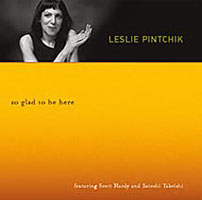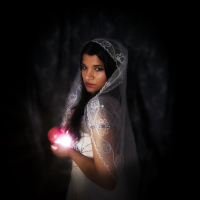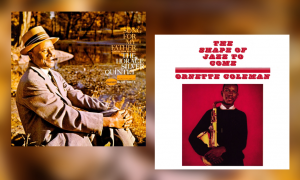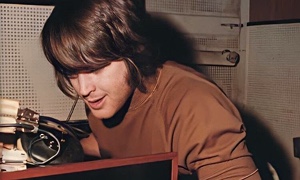Home » Jazz Articles » Building a Jazz Library » The Tzadik Factor
The Tzadik Factor
Tzadik aims to present a certain "artistic utopia" for artists who don't want to have their creations diluted by record labels, extremely rare in the music industry. This label doesn't believe in musical categories or barriers and their outbring brings a famous quote to mind. When discussing his "new, strange, and exciting" music with Charlie Parker, a reporter asked Bird, "What kind of music do you call this? How do you label it?" Bird's response fit perfectly: "Let's just call it 'music'." Here are some of the highpoints of Tzadik's music.
 | Masada: Live in Sevilla 2000 (2000) The quartet that finally gained Zorn notoriety and for good reason. The Masada Songbook is a genius collection of Zorn compositions that take in all influences (hardcore punk, Sephardic, Arabic, jazz, rock, surf, and classical) that Zorn classifies as "Radical Jewish Culture" music. Standout tracks from this concert include "Beeroth," "Ne'eman," and "Bith Aneth." The empathy is inspiring and leaves the listener awestruck. MUCH more than Ornette Coleman meets klezmer!!! |
 | Jamie Saft: Sovlanut (2000) Nothing short of a stroke of genius. Saft creates music that uses electronic and acoustic instruments to draw upon reggae, Arabic, and Jewish influences, and the result is an innovative original effort that is club music at its best. Joining Saft's wizard-like keyboard skills are Chris Speed on clarinet, Jim Black on drums and Jonathan Maron (from Groove Collective) on bass. One of the hippest selections in the Tzadik catalogue. |
 | John Zorn: Filmworks Vol. I (1986-1990) (1997) The first in a 14-volume series that exposes Zorn's talents as a film score composer, here from 1986 - 1990. Zorn uses inventive instrumentation throughout, times range from 5 minutes to 15 seconds, and the styles range the gammut: "Sex-Shop Boogaloo" is New Orleans-influenced; "Going to Dinner" sounds like a Seijun Suzuki film noir blues; and "Death Waltz Fantasy" finds the central nerve of your spine to give you icy goosebumps. |
 | Marc Ribot: Shoe String Symphonettes (1997) Ribot's first film music effort for Tzadik is amazing! Ribot has an instantly indentifiable sound on his guitar, and his film compositions are just as unique. This palette of weird, strange, and beautiful textures has significantly contributed to the Tzadik film catalogue. Dave Douglas and even Zorn himself also appear here. |
 | John Zorn: The Big Gundown: The Music of Ennio Morricone (1990) Take Morricone's wonderful, lyrical melodies for such films as The Good, the Bad, and the Ugly , The Big Gundown , and The Sicilian Clan , and run them through the ever- innovative Zorn filter. The result is pure, intense, musical magic. Zorn creates various sonic soundscapes that instantly create a picture in the mind. With classics such as "The Ballad of Hank McCain," sung by Mike Patton, "Poverty (Once Upon a Time in America)" featuring Toots Thielemans, and "The Sicilian Clan" featuring Mark Feldman, Erik Friedlander, and Greg Cohen (later known as the Masada String Trio) with Joey Baron, Cyro Baptista, and Marc Ribot, one can sees that this a Downtown NYC tour de force. Exceptional music, exceptional arrangements, exceptional musicians. |
 | Masada String Trio: The Circle Maker (1998) This string trio consists of Mark Feldman (violin), Erik Friedlander (cello), and Greg Cohen (bass). Their performance of and improvising over compositions from Zorn's Masada Songbook provide aural testament to Zorn's infectious musical concoctions: It doesn't matter if it's Zorn, Douglas, Baron, and Cohen playing these compositions, or not — Feldman, Friedlander, and Cohen keep the same excitement level of "masada magic." |
 | Steven Bernstein: Diaspora Soul (1999) Best known for his work with Sex Mob, Bernstein emits tantalizing and zany arrangements of Jewish music within the contexts of Afro-Cuban and New Orleans styles. Funky, groovin', and just pure genius at work! Bernstein has had many successful projects in the past, but nothing like this effort. This will remain in your CD player for months. |
 | John Zorn: Bar Kokhba (1996) The Masada Songbook set for chamber groups. Zorn's music in the hands of musical masters like Ribot, Joey Baron, Cyro Baptista, John Medeski, David Krakauer, Douglas, Cohen, and Anthony Coleman creates outrageous moments and some tear-jerking moments too. Outstanding tracks are "Maskil," a duet between Ribot and Cohen, "Nefesh" in a Bud Powell-esque swingin' piano trio, and "Sheloshim" with Dave Douglas. Must have for any Zorn fan, and a great find for any fan of Jewish music. |
 | Ikue Mori/ Fred Frith/ Kato Hideki Death Ambient (1995) Music like no other — brooding, dark, and ominous music you will not find anywhere else. Frith's guitar mastery and Mori's drum samplings are simply amazing. Hideki's bass (from Groove Collective) is one of the most poignant traits of the entire effort. Definitely experimental, undiluted in its pure artistic vision and form, and could only happen on Tzadik. |
 | Naked City: Black Box (Torture Garden / Leng Tch'e) (1997) Naked City, like Masada, draws upon many influences: Film music, surf, jazz, classical, rock, and most especially hardcore. What a musical marvel! The speed metal and energetic outpouring on Torture Garden will leave any listener in a frenzy from the tightness, precision, and cohesiveness between Zorn, Baron, Frisell, Frith, Horvitz, and Yamantaka Eye. On the other hand, Leng Tch'e is more like an ambient suite that gradually climaxes to universal catastrophic proportions by the end, providing perfect complement and balance. |
 | Milton Babbitt: Occasional Variations (2003) One of the most interesting and misunderstood composers of contemporary music in the 20th Century here delivers three world premieres; the set includes difficult and challenging string quartets, an electronic music composition that creates sonic landscapes the mind could never conjure up alone, and a guitar piece definitely indebted to guitarist Eddie Lang. |
 | John Zorn: Chimeras (2003) Inspired by Arnold Schoenberg's "Pierrot Lunaire," Zorn concocts this wonderful creation with the same instrumentation that Schoenberg used with the addition of percussion. Zorn writes each movement to avoid a specific designated pitch to create one of his most beautifully haunting works, leaving the listener with an icy hand ferociously gripping their heartstrings. |
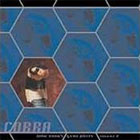 | John Zorn: COBRA (2002) Probably Zorn's most famous game piece, and for ample reason. In a performance of "COBRA," the prompter/conductor holds up various cards that indicate what the performers should do, and the rest is wonderful COBRA confusion. Rather than tell everyone in the audience what is going on, Zorn, like an ancient Kung Fu master, keeps the secret rules of the game an oral tradition to those who perform it. Just the audio portion, but one can still hear the razor-like jump cuts from one thing to the next. Experimental game music at its finest, and, once again, it could only happen at Tzadik. |
To jazz purists of the world: Regarding Tzadik, I am reminded of a quote by the genius Duke Ellington, who once said that he simply didn't believe in barriers or labels being placed on music. It was his thought that the very minute a label or category was placed upon something, it automatically diminished its overall value. Therefore, he personally believed that the highest compliment that one could ever give would be to say that something stands "beyond category." From this perspective, it's very clear that Tzadik and John Zorn definitely stand "beyond category."
Tags
PREVIOUS / NEXT
Support All About Jazz
 All About Jazz has been a pillar of jazz since 1995, championing it as an art form and, more importantly, supporting the musicians who make it. Our enduring commitment has made "AAJ" one of the most culturally important websites of its kind, read by hundreds of thousands of fans, musicians and industry figures every month.
All About Jazz has been a pillar of jazz since 1995, championing it as an art form and, more importantly, supporting the musicians who make it. Our enduring commitment has made "AAJ" one of the most culturally important websites of its kind, read by hundreds of thousands of fans, musicians and industry figures every month.



